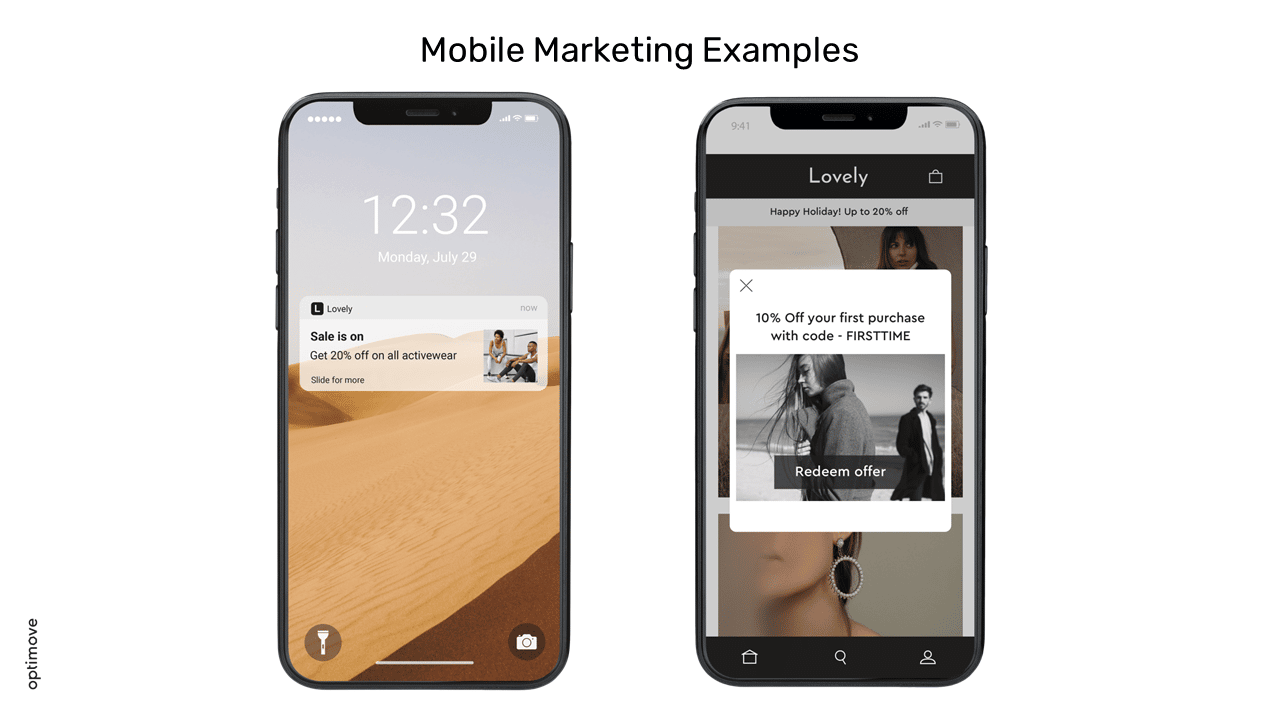
AI and the Retail Marketer’s Future
How AI transforms strategy and processes, driving the adoption of Positionless Marketing
Optimove Connect 2026: Join us in London on March 11–12 to master Positionless Marketing
Forrester: Optimove’s Total Economic Impact
Mobile marketing is any advertising or marketing campaign that promotes products or services through mobile devices. By connecting with customers through mobile devices, you can create a cohesive customer experience. Most people always have their phones with them, allowing you to connect with customers in real time. Mobile marketing is used to attract customers in an interactive and personalized way.
Mobile marketing works by connecting with customers through their mobile devices encouraging them to interact with your brand. Here are some types of mobile marketing:
In-app marketing is marketing through mobile apps. In-app marketing can be either for your own brand or for other brands. For your own brand, In-App marketing refers to the use of banners, overlays, and inbox messaging to market your products to your app users. You can engage customers who are active users of your brand’s app and guide their user experience in your app. For other brands, ads can be included on popular apps or your brand’s app. The ads can be banners, a full page, or videos. In-app marketing also allows you to increase your customer base through advertisements on popular apps.
Mobile push marketing sends marketing messages on mobile devices using push technology. It allows you to deliver relevant information to users even if they are not on your website or app. Mobile push notifications allow you to communicate with existing and potential customers in a simple and effective way.
SMS marketing is a marketing campaign via text message. You can send promotions, alerts, offers, and more to current and potential customers’ phones. Text marketing campaigns can be successful because most people have their phones with them, and it is difficult to ignore push notifications.
Social media platforms typically have billions of users, making social media a great place to advertise and promote your business. Social media marketing allows you to make a more personal connection with consumers through Facebook ads, promoted tweets, or shoppable pins on Pinterest.
Location-based marketing allows you to target a customer on their mobile device based on their location. You can create specific marketing campaigns based on your customers’ location, making the marketing campaign more relevant.
QR code marketing allows you to create a link to your website, download your app, review your business, or signup for your newsletter. Customers can scan the QR code with the camera on their smartphones and it is simple to use. QR code marketing allows you to engage more customers and can be used for almost any marketing purpose.

Mobile marketing engages customers through their mobile devices, traditional marketing is any marketing that is not online. Traditional marketing can include newspaper, television, radio, and billboard ads. Typically, traditional marketing is one-way communication, whereas, with mobile marketing, customers can interact with your business through mobile advertisements. Here are some examples of the main differences between mobile and traditional marketing:
A mobile marketing strategy is a comprehensive plan that businesses and organizations develop to promote their products or services to a mobile audience, typically through smartphones and tablets. In today’s digital age, it’s essential to have a mobile marketing strategy in place, as an increasing number of consumers rely on their mobile devices for various aspects of their lives. This strategy aims to optimize user experiences, engagement, and conversion rates within the mobile ecosystem.
Characterized by its focus on delivering content, advertisements, and interactions specifically tailored for mobile devices, a successful mobile marketing strategy leverages mobile apps, responsive websites, SMS marketing, mobile push notifications, social media platforms, and more. It prioritizes immediacy, personalization, and user-friendliness, allowing businesses to connect with their target audience in real-time, fostering customer loyalty, and achieving a competitive edge in the modern market landscape. In essence, a well-crafted mobile marketing strategy is crucial for staying relevant, enhancing customer relationships, and ensuring that your brand is accessible and engaging to mobile users.
Mobile marketing allows you to reach highly targeted customer segments and engage with them through relevant marketing campaigns. Advantages of mobile marketing include:
Mobile marketing also has some disadvantages including:
Optimove has native mobile marketing channels that include all the channels a marketer needs to deliver a personalized customer experience. Brands can create mobile push notifications, customize in-app messages, create web push messages, leverage geofences and beacon technology, and use deferred deep linking to targeted market segments. With Optimove, customers can consolidate marketing efforts to plan, execute, and measure marketing campaigns in one place.
Contact us today or request a Web demo to learn how you can use Optimove to execute personalized mobile marketing campaigns and grow your business.
The advantage of mobile marketing is the ability to reach customers regardless of location. Marketers can deliver personalized, relevant communications with immediacy to customers enabled by data analytics and targeting capabilities. It can lead to a customer’s higher engagement rate with a brand due to the personal nature of mobile devices. Additionally, mobile marketing can be cost-effective, allowing businesses to reach large audiences with relatively low investment. Integrating features like GPS and push notifications also enables highly contextual marketing, which can significantly improve the effectiveness of promotional efforts.
To ensure the effectiveness of your mobile marketing strategy, it’s crucial to understand your target audience’s preferences and behaviors on mobile devices. Use responsive design for your websites and emails to ensure they look good and function well on all device types. Employ data analytics to segment your audience and tailor your messages for personalization. Test different strategies and keep an eye on key performance indicators (KPIs) like click-through rates, conversion rates, and engagement levels to understand what works best for your audience. Additionally, always prioritize user experience, ensuring that your content is valuable and accessible without overwhelming users with too much information or too many notifications.
Measuring the success of mobile marketing campaigns involves tracking and analyzing a variety of metrics that align with your campaign goals. Key performance indicators (KPIs) to consider include:
Forrester: Optimove’s Total Economic Impact
The Forrester Total Economic Impact™ Study shows that Optimove’s Positionless Marketing Platform drives an 88% boost in campaign efficiency.



